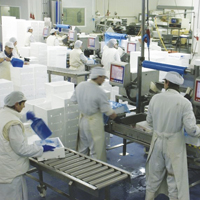Negative image affecting seafood recruitment – survey

THE negative perception of working in the seafood processing industry is one of the main barriers to recruiting enough British staff, company chiefs have said.
Their comments are contained in the latest comprehensive Seafish quarterly update on the labour situation, first launched late last year in the light of Brexit.
The result is that, for a variety of reasons including Brexit, seafood processors are finding it harder to recruit enough people. The survey says that 38 per cent of firms in the sample told Seafish it became more difficult to fill vacancies in the three month period between April and June this year, compared with the previous quarter. Only five per cent said things were easier.
Scotland appears to be having the most problems where almost half of the Grampian-based seafood processors surveyed reported that recruitment had become more difficult in the April – June period. Previous research by Seafish found that processing sites in the Grampian region employed the largest proportion of non-British staff (mostly European).
“This suggests that seafood processors in the Grampian region are more likely to be affected by changes in the availability of European workers,” the report adds. One Grampian processor said: “Our European workers are scared of the Brexit outcome and are returning home. We’re finding it more and more difficult to attract EU workers.”
A processor in the Midlands added: “We depend on workers from abroad; the unclear Brexit situation is the biggest factor affecting our recruitment.”
On the Humber (Grimsby and Hull) only two of the sample’s seafood processing sites reported that recruitment in April – June 2018 was easier than at the start of January.
According to 14 per cent of survey respondents (10 processing sites) people from the EU are now less willing to come to the UK to work in seafood processing. The explanations for this included the uncertainty surrounding Brexit, the lower value of sterling, and efforts of European countries to encourage their citizens to return home (including financial incentives).“
Among its conclusions Seafish said: “The main barrier to recruiting British staff in the seafood processing industry remains the negative perception of the industry held by potential candidates.”
In total, 55 per cent of processors sampled reported that British workers did not want to work in seafood processing factories. The reasons for this included the physicality of the job, the cold and wet working environment and unsociable working hours. One fifth of respondents said that British candidates “are more likely to stay on benefits than work.” Some employers admitted that the work can be physically demanding.
“Over 80 per cent of processors in the sample said that they would increase their efforts to recruit locally if they were unable to hire enough staff using their current recruitment techniques. “
Seafish said increasing efforts to recruit locally remained the most common response to questions about adaptations processors would make if they could not find the staff they need. The next most common response was to increase use of employment agencies (68 per cent of respondents) and increase overtime available to existing workers (41 per cent of respondents).
Despite misgivings, almost two thirds of those sampled felt confident about their ability to meet their planned production levels during the present quarter (July to end of September) Only four per cent ( three sites) had doubts about meeting targets while 16 per cent ( 11 sites) expressed slight doubts.

